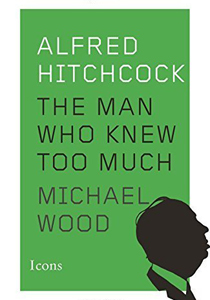Reading Michael Wood’s monograph “Alfred Hitchcock: The Man Who Knew Too Much” (2015, Houghton’s Icons series) is like chatting with an erudite friend about a mutually enjoyed topic. You won’t want this to be your first biography, but once you have a good grasp of the director’s career and the baseline interpretations of his films, you’ll enjoy it as a garnish.
Rather than a biography, this is more of a collection of essays and reviews glued together by the chronology of Hitchcock’s life. Wood, a Princeton professor, writes about the Hitchcock films he feels like writing about, with an emphasis on story more so than style, since he’s a literature scholar. I get the sense that he studied other writers’ thoughts on these movies (a huge bibliography caps the book) — and then expounds or provides alternative perspectives — more so than studying Hitchcock’s complete catalog.
Entire films, even significant ones, are glossed over. The book comes off like Wood is being modest, rather than talking our ear off about all 52 films. I wouldn’t have minded if “The Man Who Knew Too Much” had gone beyond the 119 pages, but he’s saying what he had to say, and so be it.

“Alfred Hitchcock: The Man Who Knew Too Much” (2015)
Author: Michael Wood
Genre: Biographical monograph
This is also not the go-to book for anything controversial. For instance, Wood mentions Hitchcock’s bad behavior toward Tippi Hedren, but you’ll have to go elsewhere for the full story. Even though this is a fun, analytical biography, Wood remains scholarly, not gossipy.
The title, since it’s also the name of two Hitchcock films, might cause confusion when tracking it down, but I get what Wood is going for. Hitchcock was smart about how to manipulate human emotions in a cinematic tale. But his intelligence might not have made him happy; his fears about, for instance, being wrongly accused by the police, allowed him to crisply explore the topic.
Skirting the edges of plausibility
Wood shares his opinions, but a reader doesn’t get a sense that he’s full of himself. He backs up his views with evidence from the work itself, and – appropriate since Hitch was an influencer more so than one who has been influenced – he rarely compares Hitch’s work to other films. An exception: He draws a connection between “Strangers on the Train” and “Who Framed Roger Rabbit?,” two films guided by the storyteller’s whims rather than logic.
Deeper dives go to later Hitch films, perhaps part of a notion that the Master of Suspense has figured out his identity (or how he wants to be perceived) by this time. Comparing the two Ernest Lehman-penned films, Wood wonders if he’s the only person who believes “Family Plot” is as good as “North by Northwest.” I was happy to see his love for Hitch’s final film, since I’m the other person who loves it.

Even first-time viewers can tell the plot is beside the point in “NxNW,” but I like how Wood reveals that was Hitch’s intent: to see if he could base the plot not merely on something trivial, but on nothing at all. (The bad guys try to kill Cary Grant’s Thornhill because they think he’s George Kaplan, who is a made-up person.) I have a new appreciation for “NxNW” as a treatise on the absurdity of spies and spy-catchers chasing their own tails, like Philip K. Dick’s novel “A Scanner Darkly” would later do for the Drug War.
I could listen to any sharp person pontificate about “Vertigo,” so that section is also a pleasure. Wood approaches BFI’s No. 2 movie of all time from the angle of Elster’s scheme. It got me thinking about how, even though the scheme is absurd, it’s plausible in the details. While it might be fair to say “Vertigo” is great even if it makes no logical sense, I’m fascinated by how it does make sense despite its weirdness. Wood also goes deeper into the source material, the French novel “The Living and the Dead,” than you’ll usually find.
Though not as thorough or focused as it could have been, Wood proves he knows a lot – but not “too much” — about Hitchcock’s oeuvre. If we lived in a world where people sat around and theorized about cinema (like the dinner party in “Rope,” minus the corpse), I’d suggest perusing “The Man Who Knew Too Much” to find discussion-starters with your film-geek friends.
RFMC’s Alfred Hitchcock series reviews works by the Master of Suspense, plus remakes and source material. Click here to visit our Hitchcock Zone.

